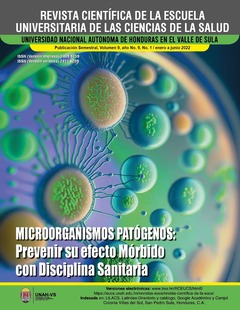Impacto de la implementación de inicio temprano de terapia antirretroviral en nuevos diagnósticos de VIH: estudio de casos y controles
DOI:
https://doi.org/10.5377/rceucs.v9i9.16183Palabras clave:
Antirretrovirales, Inmunosupresión, VIHResumen
En Honduras aún se prioriza asegurar la aceptación del diagnóstico de Virus de Inmunodeficiencia Humana (VIH) y la adherencia al tratamiento del Terapia Anti Retroviral (TAR), provocando retraso en su inicio, consecuencias negativas y alto riesgo de muerte. Objetivo: Evaluar el impacto del inicio temprano de TAR en pacientes con nuevos diagnósticos de VIH en el Hospital Nacional Mario Catarino Rivas (HNMCR). Pacientes y Métodos: Investigación analítica, observacional de casos y controles. Muestra: 62 casos que iniciaron TAR temprano, de enero a agosto del 2019 y 62 controles que iniciaron TAR en el 2018, fuera de la estrategia de inicios tempranos. Se tomaron datos de expedientes clínicos y se vacío la información en instrumento tipo cuestionario. Resultados: Se encontró más rápida vinculación al servicio y más inicios tempranos de TAR en el grupo casos (OR 19.6, IC 95% 7.2-53.0, p=0.000), una mayor captación en etapa temprana A1 (OR 3.45, IC 95% 1.36-8.59, p=0.006), un menor cambio de estadio clínico (OR 2.35, IC 95% 0.92-5.98, p= 0.070), mayor cumplimiento de evaluación psicológica (OR 8.15, IC 95% 3.42-19.4, p=0.000), menor riesgo de infecciones oportunistas (OR 3.01, IC 95% 1.34-6.74, p=0.006), menor riesgo de hospitalización (OR 1.33, IC 95% 0.46-3.84, p=0.596), mayor tamizaje de IO (p=0.000). Conclusión /Recomendación: El inicio del TAR en los primeros 7 días posterior al diagnóstico aporta beneficios clínicos y profilácticos, mejorando la calidad de vida y disminuyendo la transmisibilidad del virus. Se recomienda protocolizar los inicios tempranos como estrategia de atención a los nuevos diagnósticos de VIH.
Descargas
322




